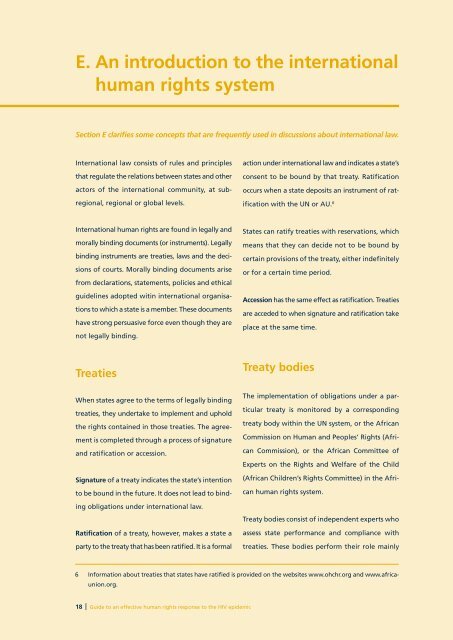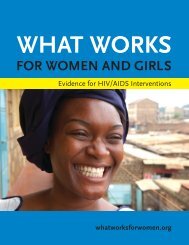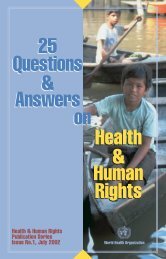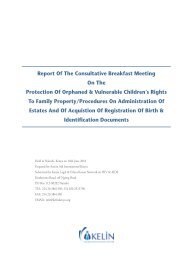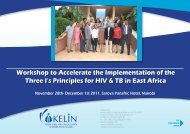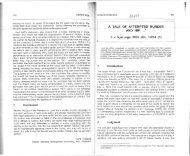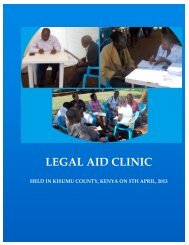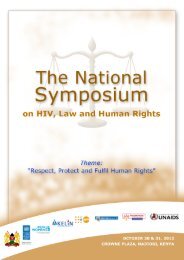Guide to an effective human rights response to the HIV epidemic
Guide to an effective human rights response to the HIV epidemic
Guide to an effective human rights response to the HIV epidemic
You also want an ePaper? Increase the reach of your titles
YUMPU automatically turns print PDFs into web optimized ePapers that Google loves.
E. An introduction <strong>to</strong> <strong>the</strong> international<br />
hum<strong>an</strong> <strong>rights</strong> system<br />
Section E clarifies some concepts that are frequently used in discussions about international law.<br />
International law consists of rules <strong>an</strong>d principles<br />
that regulate <strong>the</strong> relations between states <strong>an</strong>d o<strong>the</strong>r<br />
ac<strong>to</strong>rs of <strong>the</strong> international community, at subregional,<br />
regional or global levels.<br />
action under international law <strong>an</strong>d indicates a state’s<br />
consent <strong>to</strong> be bound by that treaty. Ratification<br />
occurs when a state deposits <strong>an</strong> instrument of ratification<br />
with <strong>the</strong> UN or AU. 6<br />
International hum<strong>an</strong> <strong>rights</strong> are found in legally <strong>an</strong>d<br />
morally binding documents (or instruments). Legally<br />
binding instruments are treaties, laws <strong>an</strong>d <strong>the</strong> decisions<br />
of courts. Morally binding documents arise<br />
from declarations, statements, policies <strong>an</strong>d ethical<br />
guidelines adopted witin international org<strong>an</strong>isations<br />
<strong>to</strong> which a state is a member. These documents<br />
have strong persuasive force even though <strong>the</strong>y are<br />
not legally binding.<br />
States c<strong>an</strong> ratify treaties with reservations, which<br />
me<strong>an</strong>s that <strong>the</strong>y c<strong>an</strong> decide not <strong>to</strong> be bound by<br />
certain provisions of <strong>the</strong> treaty, ei<strong>the</strong>r indefinitely<br />
or for a certain time period.<br />
Accession has <strong>the</strong> same effect as ratification. Treaties<br />
are acceded <strong>to</strong> when signature <strong>an</strong>d ratification take<br />
place at <strong>the</strong> same time.<br />
Treaties<br />
Treaty bodies<br />
When states agree <strong>to</strong> <strong>the</strong> terms of legally binding<br />
treaties, <strong>the</strong>y undertake <strong>to</strong> implement <strong>an</strong>d uphold<br />
<strong>the</strong> <strong>rights</strong> contained in those treaties. The agreement<br />
is completed through a process of signature<br />
<strong>an</strong>d ratification or accession.<br />
Signature of a treaty indicates <strong>the</strong> state’s intention<br />
<strong>to</strong> be bound in <strong>the</strong> future. It does not lead <strong>to</strong> binding<br />
obligations under international law.<br />
Ratification of a treaty, however, makes a state a<br />
party <strong>to</strong> <strong>the</strong> treaty that has been ratified. It is a formal<br />
The implementation of obligations under a particular<br />
treaty is moni<strong>to</strong>red by a corresponding<br />
treaty body within <strong>the</strong> UN system, or <strong>the</strong> Afric<strong>an</strong><br />
Commission on Hum<strong>an</strong> <strong>an</strong>d Peoples’ Rights (Afric<strong>an</strong><br />
Commission), or <strong>the</strong> Afric<strong>an</strong> Committee of<br />
Experts on <strong>the</strong> Rights <strong>an</strong>d Welfare of <strong>the</strong> Child<br />
(Afric<strong>an</strong> Children’s Rights Committee) in <strong>the</strong> Afric<strong>an</strong><br />
hum<strong>an</strong> <strong>rights</strong> system.<br />
Treaty bodies consist of independent experts who<br />
assess state perform<strong>an</strong>ce <strong>an</strong>d compli<strong>an</strong>ce with<br />
treaties. These bodies perform <strong>the</strong>ir role mainly<br />
6 Information about treaties that states have ratified is provided on <strong>the</strong> websites www.ohchr.org <strong>an</strong>d www.africaunion.org.<br />
18 | <strong>Guide</strong> <strong>to</strong> <strong>an</strong> <strong>effective</strong> hum<strong>an</strong> <strong>rights</strong> <strong>response</strong> <strong>to</strong> <strong>the</strong> <strong>HIV</strong> <strong>epidemic</strong>


